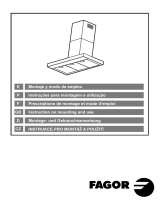
Installation - Fig. 5-6
The cooker hood must be placed at a minimum distance of 50 cm
from the cooking plane for electric cookers and 75cm for gas or
mixed cookers.
The hood is equipped with a top air outlet B for discharge of fumes
to the outside (Ducting version – exhaust pipe and pipe fixing
clamps not provided).
Should it not be possible to discharge cooking fumes and vapour to
the outside, the hood can be used in the filter version, fitting an
activated carbon filter and the deflector F
on the support (bracket) G, fumes and vapours are recycled through
the top grille H by means of an exhaust pipe connected to the top air
outlet B and the connection ring mounted on the deflector F (exhaust
pipe and pipe fixing clamps not provided).
The models with no suction motor only operate in ducting mode, and
must be connected to an external suction device (not supplied).
Preliminary information for installation of the hood:
Disconnect the hood during electrical connection, by turning the
home mains switch off.
1. Rest the suction unit on a flat surface and thread the lower part
of the hood onto it (remove the grease filter/s).
2. Make all the electrical connections between the two parts.
3. Fasten the hood to the suction unit using 6 screws.
4. Using a pencil, draw a line on the wall, extending up to the
ceiling, to mark the centre. This will facilitate installation.
5. Rest the drilling template against the wall: the vertical centre line
printed on the drilling template must correspond to the centre
line drawn on the wall, and the bottom edge of the drilling
template must correspond to the bottom edge of the hood: bear
in mind that, when installation is complete, the underside of the
hood must be at least 50 cm above the cooker top in the case
of electric cookers, and at least 75 cm above the cooker top in
the case of gas or mixed cookers.
6. Rest the support bracket on the drilling template so that it
coincides with the dotted rectangle, mark the two outer holes
and drill them, remove the drilling template, insert 2 wall plugs
and fix the hood support bracket into place using two 5x45mm
screws.
7. Hang the hood on the bracket.
8. Adjust the distance of the hood from the wall.
9. Adjust the horizontal position of the hood.
10. Mark the drill hole, using a pencil, for fastening the hood to the
wall (two drill holes are necessary for fastening).
11. Remove the hood from the bracket.
12. Drill at the point marked (Ø8mm - see operation 10).
13. Insert 2 wall plugs.
14. Rest the chimney support bracket G against the wall, touching
the ceiling. Use the support bracket as a drilling template (the
small slot formed on the support must coincide with the line
drawn on the wall as above – operation 4) and mark 2 holes with
a pencil, dril the holes (Ø8mm), insert 2 wall plugs.
15. Fix the chimney support bracket to the wall using two 5x45mm
screws.
16. Hook the hood onto the bottom bracket.
17. Fasten the hood to the wall with 2 5x45 mm screws
(ABSOLUTELY NECESSARY).
18. Connect a pipe (pipe and pipe clamps not provided, to be
purchased separately) for discharge of fumes to the connection
ring located over the suction motor unit.
If the hood is to be used in ducting version, the other end of the
pipe must be connected to a device expelling the fumes to the
outside. If the hood is to be used in filter version, fix deflector F
to the chimney support bracket G using 4 screws, and connect
the other end of the pipe to the connection ring on deflector F.
19. Make the electrical connections.
20. Apply the aesthetic metal cover on the upper side of the vapor
cover and, if supplied, apply the glass aesthetic cover over the
metal cover.
21. Affix the aesthetic metal cover, from inside the hood, to the
structure using 4 screws.
22. Apply the chimney stacks (22a) and fasten them at the top to the
chimney support G (22b) using 2 screws (22c).
Replace the grease filter/s and check that the hood is operating
correctly.
Electrical connection
The electrical tension must correspond to the tension noted on the
label placed inside the cooker hood. Connect the electrical plug,
where provided, to the an easily accessible outlet in conformity with
local standards in force.
Where an electrical plug is not provided (for direct connection to
electrical network) place a standards approved bipolar switch with
an aperture distance of not less than 3mm (accessible) from the
contacts.
INSTRUCTION ON MOUNTING AND USE
Consult the designs in the front pages referenced in the text by alphabet letters. Closely follow the instructions set out in this manual. All responsibility,
for any eventual inconveniences, damages or fires caused by not complying with the instructions in this manual, is declined.
GB









